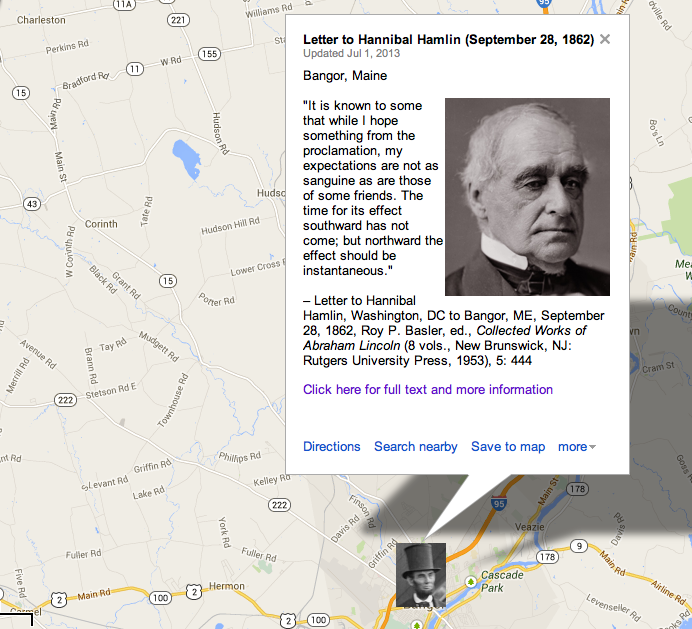Ranking
#85 on the list of 150 Most Teachable Lincoln Documents
Annotated Transcript
“The North responds to the proclamation sufficiently in breath; but breath alone kills no rebels.”
On This Date
HD Daily Report, September 28, 1862
The Lincoln Log, September 28, 1862
Custom Map
How Historians Interpret
“Not too many days after the preliminary proclamation was issued, Vice President Hannibal Hamlin wrote a letter to the president to express his ‘undissembled and sincere thanks for your Emancipation proclamation,’ which he predicted would ‘stand as the great act of the age… wise in Statesmanship as it is Patriotic.’ But Lincoln was not so sure. In a reply he labeled ‘strictly private,’ the president poured out his fears and frustrations over the early public response to his document. The fascinating letter reveals a chief executive who knows he will be judged not just by history but by his public constituency – and is clearly not at all sure he will emerge a winner. Modern Americans who doubt the revolutionary impetus and grand daring behind Lincoln’s most famous act will understand from the Hamlin letter how unpredictable its author believed its impact would be.”
— Frank J. Williams, “’Doing less’ and ‘Doing more’: The president and the Proclamation – Legally, Militarily, and Politically,” in The Emancipation Proclamation: Three Views ed. Harold Holzer, Edna Greene Medford, Frank J. Williams (Baton Rouge: Louisiana State University Press, 2006), 66.
“Public response to emancipation did not encourage Lincoln. On September 28, he told his vice-president that ‘while I hope something from the proclamation, my expectations are not as sanguine as are those of some friends. The time for its effect southward has not come; but northward the effect should be instantaneous. It is six days old, and while commendation in newspapers and by distinguished individuals is all that a vain man could wish, the stocks have declined, and troops come forward more slowly than ever. This, looked soberly in the face, is not very satisfactory. We have fewer troops in the field at the end of six days than we had at the beginning – the attrition among the old outnumbering the addition by the new. The North responds to the proclamation sufficiently in breath; but breath alone kills no rebels.’”
— Michael Burlingame, Abraham Lincoln: A Life (2 volumes, originally published by Johns Hopkins University Press, 2008) Unedited Manuscript by Chapter, Lincoln Studies Center, Volume 2, Chapter 28 (PDF), 3530.
NOTE TO READERS
This page is under construction and will be developed further by students in the new “Understanding Lincoln” online course sponsored by the House Divided Project at Dickinson College and the Gilder Lehrman Institute of American History. To find out more about the course and to see some of our videotaped class sessions, including virtual field trips to Ford’s Theatre and Gettysburg, please visit our Livestream page at http://new.livestream.com/gilderlehrman/lincoln

